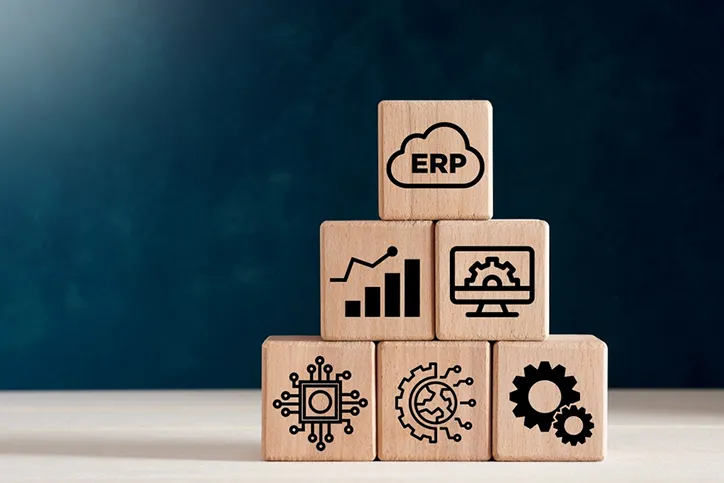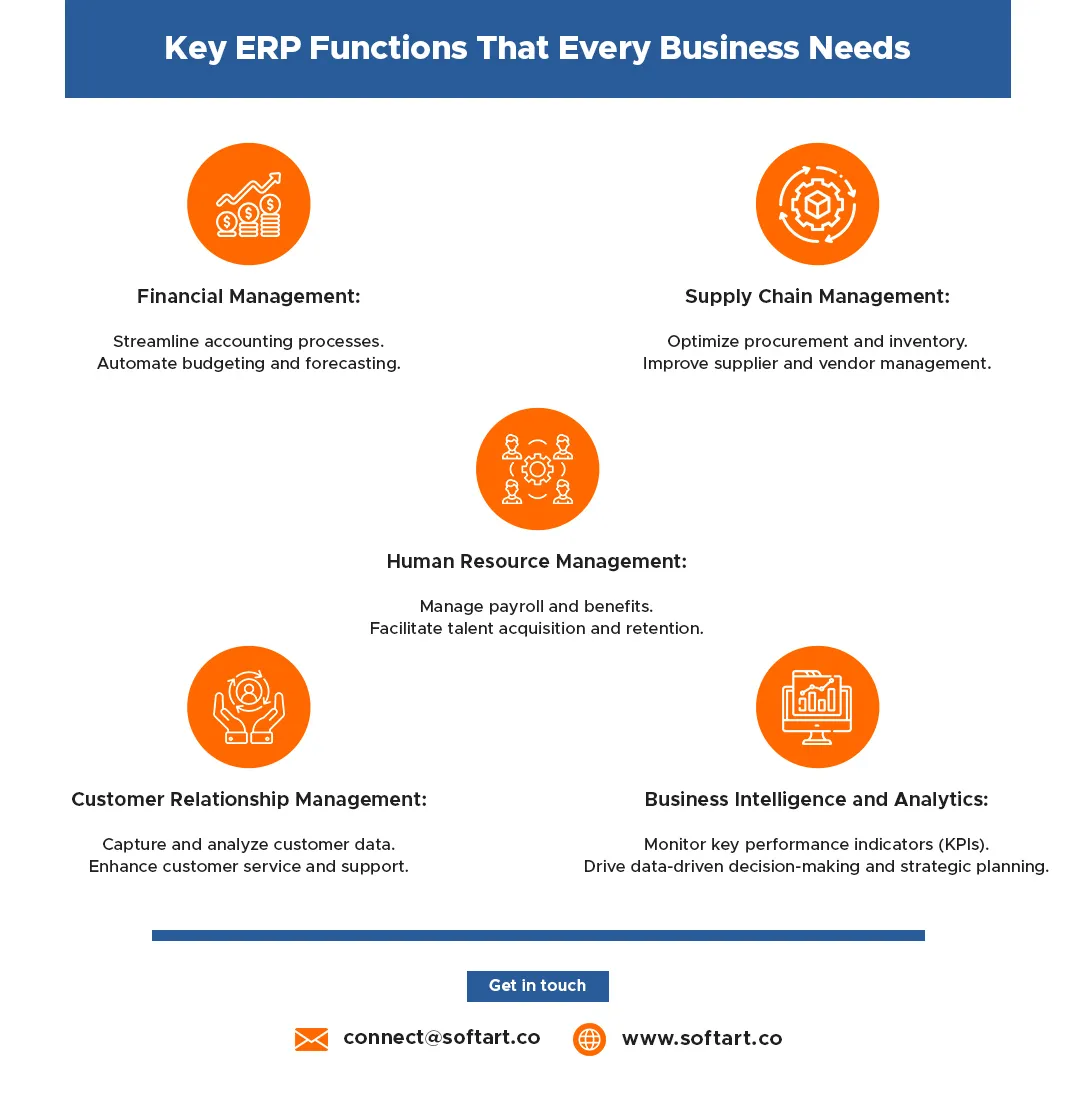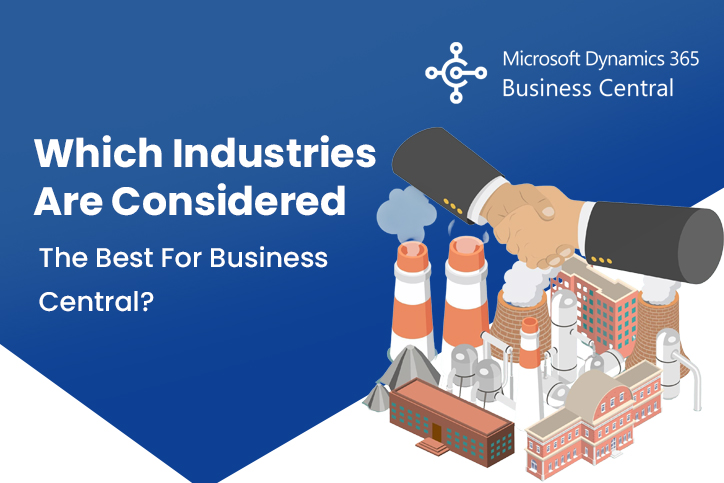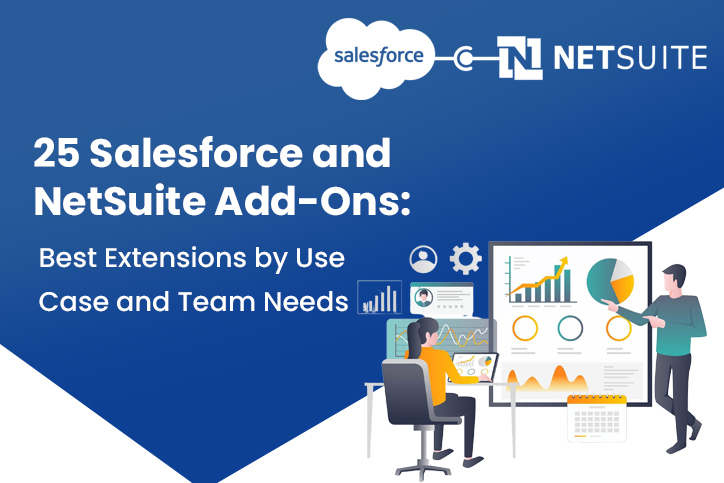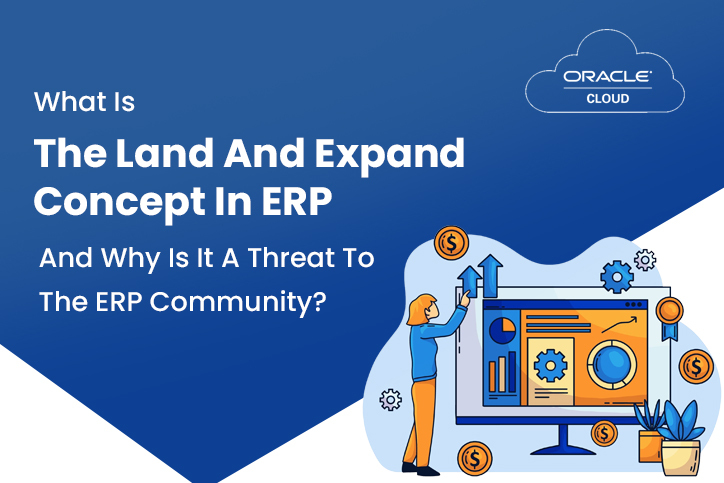When you’re dealing with modern commerce, success hinges on more than just great products or services. In business, it’s about orchestration—seamlessly aligning every area of your organization to operate seamlessly, maximizing efficiency and driving growth.
And Enterprise Resource Planning (ERP) has the potential to transform businesses into well-oiled machines.
From the bustling floors of manufacturing plants to the intricate web of global supply chains, ERP solutions like Oracle Fusion Cloud ERP and specialized manufacturing and distribution software are the backbone of operations. They have revolutionized how businesses operate by integrating various functions into a unified platform.
Let’s discuss the core functions of ERP systems further to understand how they drive organizational success.
But before we talk about the functionalities, let’s brush up on some benefits that you may not know of.
Benefits of ERP
The list of benefits is long and effects on business are massive. Here are some of the key benefits that ERP brings with it
- Streamlined Business Processes:
ERP integrates and automates processes, reducing manual tasks and improving workflow efficiency.
- Enhanced Visibility and Transparency:
The right software provides real-time access to data, fostering collaboration, informed decision-making, and regulatory compliance.
- Improved Operational Efficiency:
By automating tasks and providing insights, ERP boosts productivity and reduces operational costs.
- Better Resource Utilization:
ERP optimizes resource allocation, reducing waste and maximizing profitability.
- Scalability for Growth:
ERP systems easily adapt to business growth, accommodating changes in volume, users, and operations seamlessly.
Understanding ERP Functions
It’s time to talk about intricate workings of ERP systems. From financial management to supply chain optimization, there are multiple ERP functionalities that form the backbone of modern businesses.
1. Financial Management
At the heart of any ERP system lies robust financial management capabilities. These encompass functionalities like accounts payable, accounts receivable, general ledger, and financial reporting. Oracle Fusion Cloud ERP, for instance, streamlines financial processes, ensuring accuracy, compliance, and real-time insights into financial performance. From budgeting to cash flow management, ERP systems provide a comprehensive suite of tools to optimize financial operations.
2. Supply Chain Management:
Efficient supply chain management is critical for businesses to meet customer demands while controlling costs. ERP solutions offer features for procurement, inventory management, demand forecasting, and logistics coordination. With ERP manufacturing software, manufacturers can streamline production processes, manage raw material inventory, and enhance collaboration with suppliers. Distribution ERP software, on the other hand, enables seamless order fulfillment, inventory tracking, and delivery management, ensuring timely delivery to customers.
3. Human Resource Management:
Managing human capital effectively is paramount for organizational success. ERP systems encompass modules for HR management, including payroll processing, employee data management, performance evaluation, and training administration. These functionalities streamline HR processes, enhance workforce productivity, and facilitate strategic decision-making. With Oracle Fusion Cloud ERP, organizations can optimize HR operations, from recruitment to retirement, fostering employee engagement and retention.
4. Customer Relationship Management:
In today’s competitive landscape, nurturing customer relationships is crucial for business growth. ERP systems integrate customer relationship management (CRM) functionalities to manage interactions with customers across various touchpoints. From lead generation to post-sales support, CRM modules enable businesses to track customer interactions, analyze customer data, and personalize marketing efforts. By leveraging ERP solutions, organizations can enhance customer satisfaction, drive loyalty, and maximize lifetime value.
5. Business Intelligence and Analytics:
Data-driven decision-making is the cornerstone of modern business strategy. ERP systems offer robust business intelligence and analytics capabilities to transform data into actionable insights. With built-in analytics tools and customizable dashboards, organizations can monitor key performance indicators, identify trends, and forecast future outcomes. Oracle Fusion Cloud ERP empowers businesses with real-time analytics, enabling agile decision-making and continuous performance improvement.
However, ERP systems are not one-size-fits-all solutions; instead, they come in various types, each tailored to meet specific industry requirements and organizational needs.
Key ERP Functions That Every Business Needs

Types of ERP Systems
The diversity in ERP systems enables businesses to choose the most suitable option based on factors like industry vertical, company size, and functional requirements.
Industry-Specific ERP
Tailored for particular industries such as manufacturing, retail, healthcare, or construction, these ERP systems are customized to address industry-specific challenges and requirements. They often come with pre-configured modules and functionalities designed to streamline processes unique to that industry.
Cloud-Based ERP
Cloud-based ERP systems, such as Oracle Fusion Cloud ERP, are hosted on remote servers and accessed via the internet. They offer scalability, flexibility, and cost-effectiveness, making them an attractive option for businesses looking to minimize infrastructure costs and enhance accessibility.
On-Premises ERP
These systems are installed and maintained locally on a company’s own servers and hardware. While they offer greater control and customization options, they require significant upfront investment and ongoing maintenance.
Open-Source ERP
Open-source ERP systems provide source code access, allowing businesses to customize and modify the software according to their specific requirements. They offer flexibility and cost savings but may require technical expertise for implementation and support.
Small Business ERP
Designed for small and medium-sized enterprises (SMEs), these ERP systems offer scaled-down versions of enterprise-grade functionalities tailored to the needs and budget constraints of smaller businesses. They often focus on core functions like accounting, CRM, and inventory management, with simplified interfaces and pricing models.
Now, the question arises how to know whether you’re choosing the right ERP for your business? Well, here is what you can do.
How to Choose the Right ERP?
- Assess your business needs and objectives
- Consider scalability and flexibility
- Evaluate integration capabilities with existing systems
- Ensure user-friendliness and ease of customization
- Look for comprehensive support and training options
Let SoftArt be Your Partner in ERP Success
Equipping your business with the power of ERP systems is indispensable for driving growth and achieving operational excellence.
SoftArt offers comprehensive ERP solutions tailored to your unique business needs, whether you require Oracle Fusion Cloud ERP, ERP manufacturing software, or distribution ERP software. With our expertise and dedication to client success, we empower organizations to unlock their full potential and thrive in a rapidly evolving market.
Contact us today and fuel your business with SoftArt by your side.




